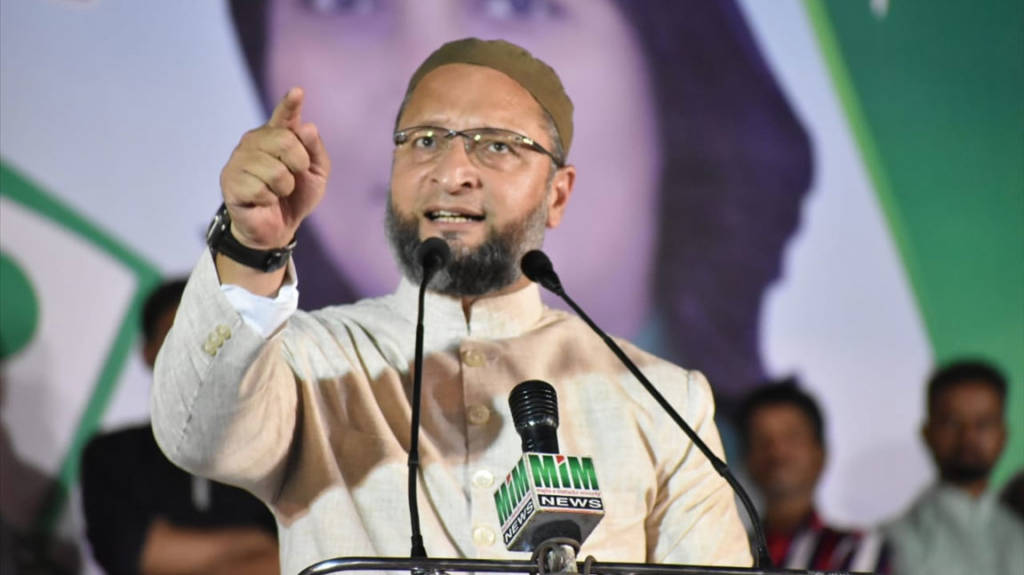At a time, when the entire nation is praising the Supreme Court for taking a meticulously sensitive and balanced approach on the Ayodhya verdict, AIMIM chief Asaduddin Owaisi has made some highly disrespectful and contemptuous remarks about the Supreme Court. In what can only be described as a shameless attempt to communalise the apex court verdict, the AIMIM chief said that ‘Supreme Court is supreme, but not infallible’. He also levelled the allegation that the Ram Janambhoomi verdict is the victory of ‘faith over facts’.
Owaisi did not only express dissatisfaction against the apex court verdict, but also went on to use some rather objectionable remarks about the judgment, especially on the issue of allotment of five acres of alternate land to the Muslims. Owaisi who does not seem to have any idea about the Indian Constitution or jurisprudence, went on to label the directive to allot five acres of alternate land as khairaat (charity). He also went on to argue that while the Muslim community is backward, it is capable of purchasing land for the purpose of building a Mosque. He added that the Ayodhya dispute was a fight for legal rights and termed the apex court’s verdict allotting 5 acres of land for a Mosque as ‘patronising’. Owaisi therefore made a direct insinuation against to the effect that the Supreme Court did not decide the legal rights, rather it delivered a judgment on the basis of faith.
Owaisi also said, “Those who demolished Babri Masjid on December 6, 1992, today Supreme Court is permitting the same people to create a trust and begin work. In the 1,045 page judgement, the Supreme Court has mentioned that the demolition of the mosque is against the law. If the Babri Masjid was not demolished what would have the judgment been? So the Supreme Court is supreme but not infallible.” Had Owaisi read the entire judgment, he would have realised that the Court allotted five acres of land to the Muslim parties only on the ground that the Mosque was wrongly demolished. What he is referring as khairaat is actually a remedy that the Court has granted to the Muslim parties in exercise of its powers to do complete justice under Article 142 of the Constitution.
Owaisi spoke about the mention of demolition of the Babri Mosque, but he chose to skip that part of the judgment which explicitly states that the evidence produced in respect of the possessory claim of the Hindus stands on a better footing to the composite whole of the disputed site than the evidence produced by the Muslims. Notwithstanding, the better title of the Hindus the Supreme Court recognised the fact that Babri Masjid demolition was against the rule of law, and the wrong committed by its demolition had to be remedied. This is why the Court resorted to Article 142 and allotted alternate land to the Muslims.
Just because the Babri demolition had been wrongfully demolished does not mean that the title of the Hindus also got extinguished. The Babri Masjid demolition was an illegal act, but it does not by itself mean that the Muslims enjoyed a better title. If Owaisi wants to know what would the judgment have been, had the Babri Masjid not been demolished on December 6, 1992, then he must know that it wouldn’t have made any difference. The Supreme Court held the demolition of Babri Masjid to be wrongful, but it nowhere suggested that the Muslims have a better title to the disputed site than the Hindus. Moreover, the fact of illegality in demolition of Babri Masjid does not grant any legitimacy to the claim of the Muslim parties. Title and demolition are therefore completely different issues. Even if the Babri Masjid had not been demolished, the Hindus would have continued to enjoy a better title.
The Supreme Court has decided the dispute after a proper appraisal of the evidence adduced by the parties, and on the application of settled legal principles. It wasn’t a case of the Court getting carried away by faith, contrary to what the AIMIM President has suggested. On the basis of the evidence produced before it, the Constitution bench of the Supreme Court, which hear the Ayodhya dispute, held that the Hindus have a better title on the disputed site than the Muslims.
Asaduddin Owaisi has therefore not only made bizarre accusations against the Supreme Court, but he has also deliberately misrepresented the essence of the Ayodhya verdict. He brought up the demolition of Babri Masjid and attacked the Supreme Court over allotment of five acres of alternate land for the Masjid. However, what Owaisi concealed was the fact that allotment of alternate land is actually the remedy of Babri Masjid demolition. This also has got nothing to do with the title to the disputed property as discussed above. His cryptic, contemptuous and grossly misleading remarks about the Ayodhya verdict should not only be seen as something inherently disrespectful of the highest court of the land, but also a mischievous attempt to incite communal passions. His utterances have the effect of misleading the Muslim community about the contents, essence and rationale of the Supreme Court verdict.
